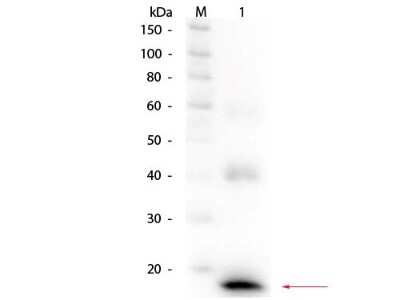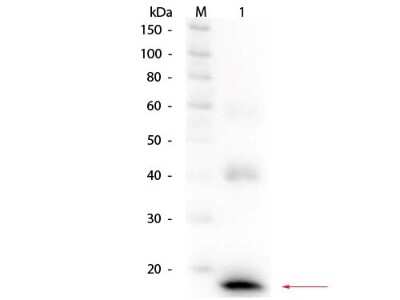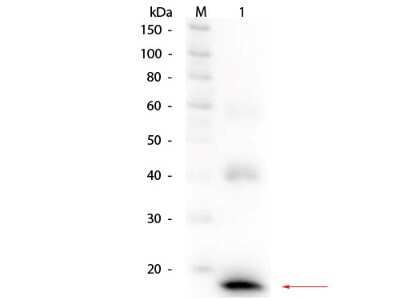IL-1 beta/IL-1F2 Antibody [Biotin]
Novus Biologicals, part of Bio-Techne | Catalog # NBP1-42768


Conjugate
Catalog #
Forumulation
Catalog #
Key Product Details
Species Reactivity
Validated:
Mouse, Rat
Cited:
Mouse
Applications
Validated:
ELISA, Flow Cytometry, Immunohistochemistry, Immunohistochemistry-Paraffin, Western Blot
Cited:
Flow Cytometry
Label
Biotin
Antibody Source
Polyclonal Rabbit IgG
Concentration
LYOPH mg/ml
Product Specifications
Immunogen
This IL-1 beta/IL-1F2 Antibody was prepared by repeated immunizations with recombinant mouse IL-1 beta/IL-1F2 produced in E.coli. The MW of recombinant mouse IL-1 beta/IL-1F2 was 17 kDa. (Uniprot: P10749)
Specificity
This antibody is primarily directed against mature, 17,000 MW mouse IL-1beta and is useful in determining its presence in various assays. The antibody does not recognize human IL-1beta or mouse IL-1alpha based on a neutralization assay. In ELISA formats and other immunoreactive assays, reactivity occurs with rat IL-1beta. This antibody will recognize 10% of the non-denatured (native) precursor 31,000 MW mouse IL-1beta containing samples but will primarily detect all of the 17,000 MW mature molecule. However, in immunoblot analysis, the usual procedure of heating the sample in SDS with or without reducing agents will facilitate denaturing of the 31,000 MW IL- 1beta precursor molecule. Denatured 31,000 precursor IL-1beta will be recognized by this antibody.
Clonality
Polyclonal
Host
Rabbit
Isotype
IgG
Description
Store vial at 4C prior to restoration. For extended storage aliquot contents and freeze at -20C or below. Avoid cycles of freezing and thawing. Centrifuge product if not completely clear after standing at room temperature. This product is stable for several weeks at 4C as an undiluted liquid. Dilute only prior to immediate use.
This is an IgG preparation of whole rabbit serum purified by DEAE fractionation
This is an IgG preparation of whole rabbit serum purified by DEAE fractionation
Scientific Data Images for IL-1 beta/IL-1F2 Antibody [Biotin]
Western Blot: IL-1 beta/IL-1F2 Antibody [Biotin] [NBP1-42768] - Lane 1: Mouse IL-1Beta Recombinant Protein. Load: 50 ng per lane. Primary antibody: Rabbit anti-Mouse IL-1Beta Antibody Biotin Conjugated at 1:1,000 overnight at 4C. Secondary antibody: HRP streptavidin secondary antibody at 1:40,000 for 30 min at RT. Block: incubated with blocking buffer for 30 minutes at RT. Predicted/Observed size: 17.5 kDa, 17.5 kDa for proteolytically processed Mouse Il-1Beta.
Western Blot: IL-1 beta/IL-1F2 Antibody [Biotin] [NBP1-42768] - Lane 1: Mouse IL-1 beta Recombinant Protein. Load: 50 ng per lane. Used at a dilution of 1:1,000 overnight at 4C.
Western Blot: IL-1 beta/IL-1F2 Antibody [Biotin] [NBP1-42768] - Lane 1: Mouse IL-1Beta Recombinant Protein. Load: 50 ng per lane. Primary antibody: Rabbit anti-Mouse IL-1Beta Antibody Biotin Conjugated at 1:1,000 overnight at 4C. Secondary antibody: HRP streptavidin secondary antibody at 1:40,000 for 30 min at RT. Block: incubated with blocking buffer for 30 minutes at RT. Predicted/Observed size: 17.5 kDa, 17.5 kDa for proteolytically processed Mouse Il-1Beta.
Applications for IL-1 beta/IL-1F2 Antibody [Biotin]
Application
Recommended Usage
ELISA
1:20000-1:100000
Flow Cytometry
1:10-1:1000
Immunohistochemistry
1:1000-1:5000
Immunohistochemistry-Paraffin
1:10-1:500
Western Blot
1:2000 - 1:10000
Application Notes
This product has been tested in dot blot and western blot and is suitable for use in neutralizations, ELISA, radioimmunoassays, flow cytometry, immunohistochemistry, and immunoprecipitation. It recognizes the 17,000 MW mature IL-1beta. For immunoblots, typically, IL-1beta is detected from supernatants or lysates of 2 x 10E6 endotoxin-stimulated peripheral blood mononuclear cells (PBMC). PBMC are stimulated for 24 hours with 1% (v/v) serum plus 10 ng/mL E.coli LPS. For immunoprecipitation pre-clearing the preparation with a non-specific Rabbit IgG to reduce background is suggested. For immunohistochemistry either paraffin fixation or cryofixation can be used for sample preparation to stain intracellular IL-1beta. For ELISA use HRP Conjugated Anti-Rabbit IgG [H&L] (Goat) (611-1302) for detection. In ELISA formats this antibody is best used as the second antibody in combination with a monoclonal antibody as a capture antibody. This antibody is also useful for neutralization of mouse and rat IL-1beta activity in bioassays. It does not neutralize the biological activity IL-1alpha. It does not neutralize the biological activity of human or primate IL-1beta. For neutralization, it is recommended to incubate the sample with a dilution of the antibody for at least 4 hours before being tested. A control of similarly diluted normal rabbit IgG is recommended. This antibody can be used for FACS analysis. Caution should be exhibited as the F( c) domain of the rabbit IgG molecule may interact with cells non-specifically.
Reviewed Applications
Read 1 review rated 5 using NBP1-42768 in the following applications:
Formulation, Preparation, and Storage
Purification
Column Chromatography
Reconstitution
Reconstitute with 100 ul deionized water (or equivalent)
Formulation
Lyophilized from 0.02 M Potassium Phosphate, 0.15 M Sodium Chloride, pH 7.2, 10 mg/mL Bovine Serum Albumin (BSA) - Immunoglobulin and Protease free
Preservative
0.01% Sodium Azide
Concentration
LYOPH mg/ml
Shipping
The product is shipped with polar packs. Upon receipt, store it immediately at the temperature recommended below.
Stability & Storage
Store lyophilized antibody at 4C in the dark. Aliquot reconstituted liquid and store at -20C. Avoid freeze-thaw cycles.
Background: IL-1 beta/IL-1F2
IL-1 beta binding to its receptor IL-1RI and the downstream signaling contributes to a dual pathophysiological role (3). On one hand, IL-1 beta signaling activates immune cells and drives CD4+ T cell polarization to T helper type 1 (Th1) and Th17 cells, resulting in anti-tumor responses and mediation of acute inflammation (2,3). However, IL-1 beta also supports tumor growth and metastasis driven by multiple mechanisms including chronic inflammation, an immunosuppressive tumor microenvironment (TME), and angiogenesis (3). Additionally, IL-1 beta signaling been implicated in the pathogenesis of neuroinflammatory diseases of the central nervous system (CNS) such as multiple sclerosis (MS), Alzheimer's disease, and diabetic retinopathy (DR) (2). Mouse studies have shown regression of tumors treated with IL-1 as well as protective effects of IL-1 beta in instances of induced colitis and colon carcinoma (3). Conversely, blocking IL-1 beta has also shown promising effect in cancer treatment, especially when combined with chemotherapeutics (2,3). Approved IL-1 beta monoclonal antibody canakinumab has shown significant therapeutic promise in the treatment of DR (2). Given its multifaceted role in disease, IL-1 beta is a promising therapeutic target.
References
1. Lopez-Castejon G, Brough D. Understanding the mechanism of IL-1beta secretion. Cytokine Growth Factor Rev. 2011;22(4):189-195. https://doi.org/10.1016/j.cytogfr.2011.10.001
2. Mendiola AS, Cardona AE. The IL-1beta phenomena in neuroinflammatory diseases. J Neural Transm (Vienna). 2018;125(5):781-795. https://doi.org/10.1007/s00702-017-1732-9
3. Bent R, Moll L, Grabbe S, Bros M. Interleukin-1 Beta-A Friend or Foe in Malignancies?. Int J Mol Sci. 2018;19(8):2155. https://doi.org/doi:10.3390/ijms19082155
4. Krumm B, Xiang Y, Deng J. Structural biology of the IL-1 superfamily: key cytokines in the regulation of immune and inflammatory responses. Protein Sci. 2014;23(5):526-538. https://doi.org/10.1002/pro.2441
5. He Y, Hara H, Nunez G. Mechanism and Regulation of NLRP3 Inflammasome Activation. Trends Biochem Sci. 2016;41(12):1012-1021. https://doi.org/10.1016/j.tibs.2016.09.002
6. Uniprot (P01584)
Long Name
Interleukin 1 beta
Alternate Names
IL-1b, IL-1F2, IL1 beta, IL1B
Gene Symbol
IL1B
UniProt
Additional IL-1 beta/IL-1F2 Products
Product Documents for IL-1 beta/IL-1F2 Antibody [Biotin]
Product Specific Notices for IL-1 beta/IL-1F2 Antibody [Biotin]
This product is for research use only and is not approved for use in humans or in clinical diagnosis. Primary Antibodies are guaranteed for 1 year from date of receipt.
